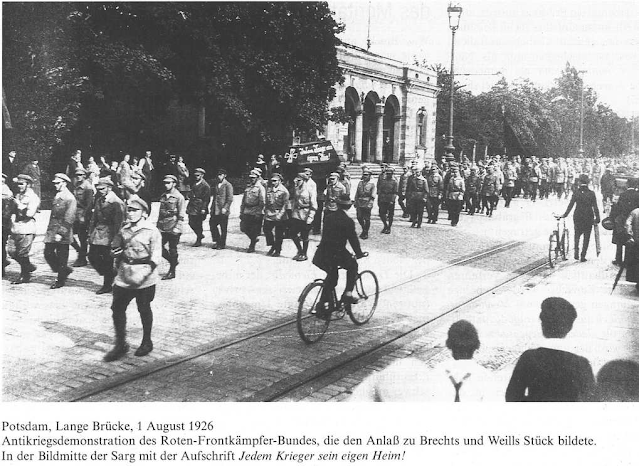 |
| Zu Potsdam unter den Eichen: German news photograph from 1926 of the anti-war demonstration that inspired Kurt Weill & Bertolt Brecht's powerful piece |
Kurt Weill's piece for unaccompanied four-part male voice ensemble, Zu Potsdam under den Eichen was premiered in Berlin in 1929. Using a text by Brecht, the piece was part of their Berliner Requiem (premiered on Radio Frankfurt in May 1929), but the piece had an independent life, being performed in November 1929 in Berlin by the Schubertchor, conductor Karl Rankl.
Brecht's poem directly refers to an historical event, an anti-war demonstration in 1926 by the Roter Frontkämpferbund (RFK), a far-left paramilitary organization affiliated with the Communist Party during the Weimar Republic (see the newspaper photograph above). According to newspaper reports, an artillery helmet, combat weapons and war honours had been placed on a coffin carried as part of the demonstration. The inscription on the coffin, which as can be seen in the photograph, read Jedem Krieger sein eigen Heim (for every warrior his own home), was a sarcastic allusion to the promise of the Supreme Army Command to allocate land to the soldiers after the end of the war and to Hindenburg's use of this slogan as an appeal for perseverance in 1917.
The piece's title refers to Unter den Eichen' ('under the oaks'), a broad street leading from Berlin to Potsdam, which was the residence of the German Emperor and his court until 1918.
The police report reads: 'The ban on carrying the coffin, which bore the inscriptions "Every warrior his own home" and "Thanks be to you for your fatherland", was ignored and it was therefore necessary to intervene at the Alter Markt. As the communists resisted the removal of the coffin and resisted the intervening officers, the coffin could only be removed and some of the perpetrators stopped by using the rubber truncheon and threatening to use firearms. Around 200 communists were injured during the rubber truncheon intervention. However, they were all taken away by their comrades. The police remained in control of the situation.'
My thanks to John for much of this information, a lot gleaned from Hubert Wisskirchen's paper on Kurt Weill's piece [see PDF]
London Concord Singers will be performing Zu Potsdam unter den Eichen on 21 March 2024 as part of its concert, Sing to the Stars, see the choir website for details.











No comments:
Post a Comment